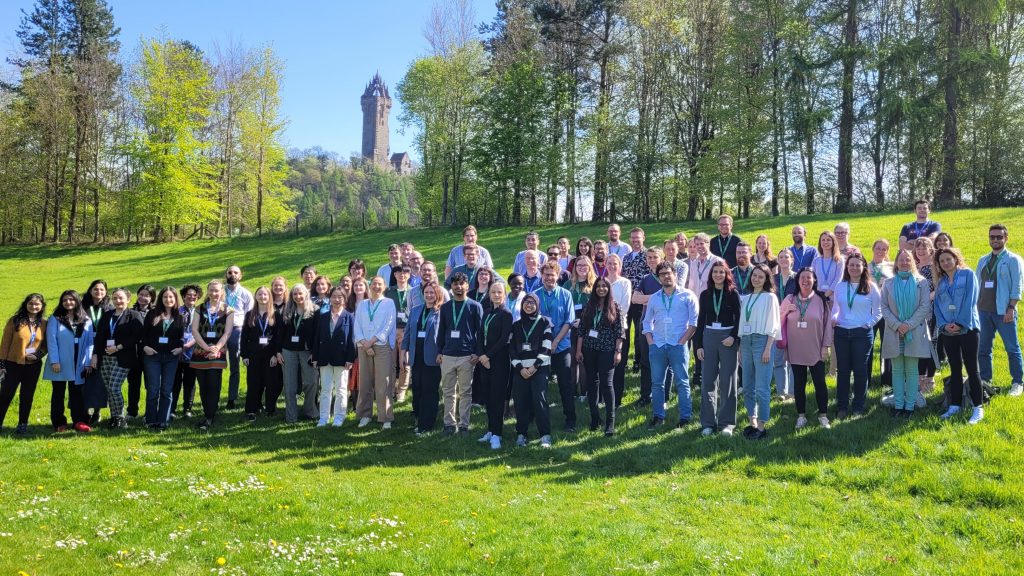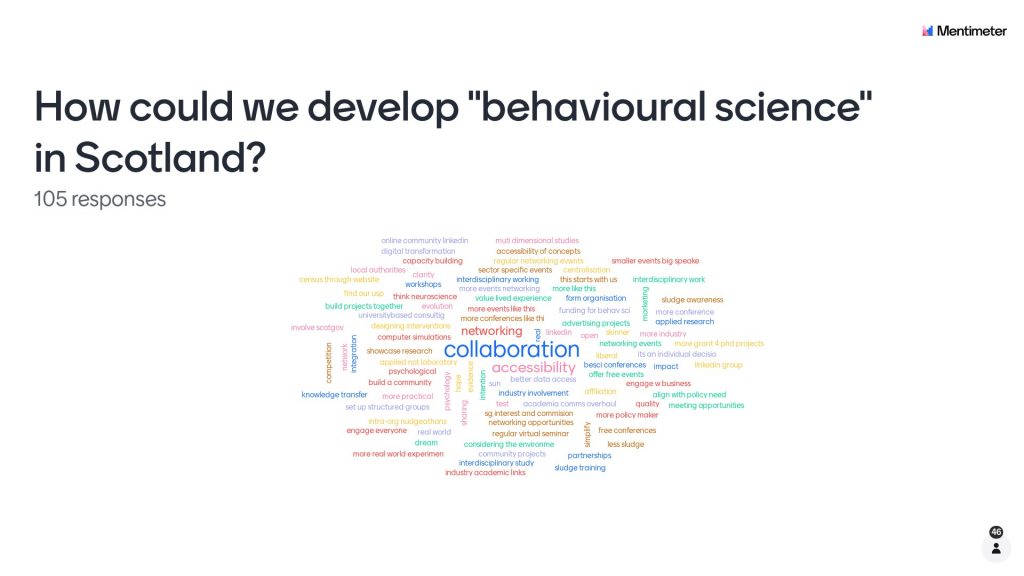The first Scottish Behavioural Science Conference took place on Thursday, May 02, 2024 at the University of Stirling.

The purpose of the conference was to develop links between behavioural scientists (e.g., from behavioural economics, social and cognitive psychology, philosophy, and related areas) throughout Scotland.
For this conference, we understood behavioural science as the study of when and why people engage in specific behaviors. We are also interested in applications of behavioural insights to change behaviour (e.g. through nudges or boosts) and inform policy making for example by guiding welfare assessments (e.g. well-being research).
Going forward:
Based on the conference, we are creating a mailing list to share information about Behavioural Science in Scotland. To sign up for this mailing list, please follow this link:
https://forms.office.com/e/5WE0H0fc0c
Here are some ideas you had about what we could do in the future:

The schedule Was as follows:
09:00 – 09:30: Welcome
09:30 – 09:45: David Comerford (University of Stirling) on “Forecasting and planning”
09:45 – 10:00: Seda Erdem (University of Stirling) on “From Mind to Plate: Understanding Food Choices through Behavioral Science”
10:00 – 10:15: Mioara Cristea (Heriot Watt University) on “Walking is my therapy: the Social and Psychological Predictors of Green Exercise”.
10:15 – 10:30: Rachel Scarfe (University of Stirling) on “The Incidence of Workplace Pensions: Evidence from the UK’s Automatic Enrollment Mandate”
10:30 – 10:45: Leonhard Lades (University of Stirling) on “Sludge, Administrative Burden, and Climate Action”
10:45 – 11:15: Coffee/Tea
11:15 – 11:30: Sinead Currie (University of Stirling) on “Using a co-design approach to promote awareness of preconception health in central Scotland”
11:30 – 11:45: Gözde Özakinci (University of Stirling) on “Environmental and health behaviour conflict: example of wet wipe use”
11:45 – 12:00: Taylor Coffey (University of Aberdeen) on “How can behavioural science help design better trials?”
12:00 – 12:10: Elizabeth Barnes (University of Stirling) on “Investing in Prevention: Leveraging Innovative Vending Machine Design to Reduce Costs of Publicly Funded Sexual Healthcare”
12:10 – 12:20: Jasmine Yang (University of Stirling) on “Are Behavioural Biases Related to Each Other? Evidence From the Online Auction Market”
12:20 – 12:30: Jayne Brown (University of Stirling) on “Emissions: a public health or environmental issue? A study on public acceptability of a driving restriction policy in the UK”
12:30 – 13:30: Lunch
13:30 – 13:45: Kathryn Colley (James Hutton Institute) on “Reconciling individual-level behavioural theories with household-level sustainable consumption outcomes”
13:45 – 14:00: Nick Hanley (University of Glasgow) on “Accounting for risk in species conservation programmes” (with C. Gerling and A. Bartczak)
14:00 – 14:15: Laure Kuhfuss (James Hutton Institute) on “Seasonal scarcity and environmental conservation: Investigating the impact of the hunger season on farmers’ decision making in Madagascar” (with S. Clot, M. Drupp, N. Hanley, and E. Raharison).
14:15 – 14:30: Danny Campbell (University of Stirling) on “Temporal framing and recall bias in event count data”
14:30 – 14:45: Liam Delaney (LSE) on “Behavioural science: evolution of structures and practice”
14:45 – 15:15: Coffee/Tea
15:15 – 15:30: Eugenio Proto (University of Glasgow) on “How well do you know your child? Cross-rater divergence in the assessment of child socio-emotional health”
15:30 – 15:45: Nicolai Vitt (University of Bristol) on “Effort Choices Amid Stress and Failures”
15:45 – 16:00: Georgios Angelis (University of Glasgow) on “An Anticipatory Utility Model of Consumption and Savings”
16:00 – 16:15: Tony Craig (James Hutton Institute) on “Modelling environmental behaviour: Do we know what we are doing or how to do it?”
16:15 – 16:30: Claudia Aravena (Heriot Watt University) on “Preferences for Conservation of Elements of Biodiversity: Do preference change between monetary and non-monetary approach?”
16:30 – 16:45: Till Stowasser (University of Stirling) on “Charmers versus rounders: Rent-price discontinuities in the German housing market”
End and socialising
The conference was organised by Till Stowasser and Leonhard Lades. For any questions and suggestions get in touch with Leo at l.k.lades@stir.ac.uk.